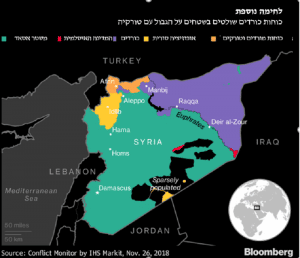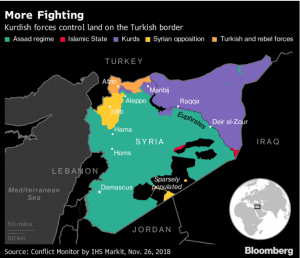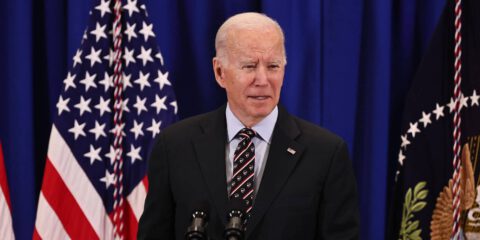האפשרות שאיראן וטורקיה ישאבו עידוד ותעוזה בעקבות ההחלטה האמריקאית מדאיגה בהחלט. המענה העיקרי למגמה זו תהיה הרתעה חזקה מצד ישראל, ששימורה עלול להגדיל את הסבירות להסלמה בסוריה ובלבנון, וכן הידרשות גדולה עוד יותר לידיה המרסנות של רוסיה. התזכורת לכך שהנשיא מתכוון למה שהוא אומר, צריכה להזכיר לנו את הצהרותיו (למשל מה-21 באוגוסט) כי “ישראל תצטרך לשלם מחיר גבוה יותר… [הפלסטינים] יקבלו משהו טוב מאוד כי הגיע תורם”. ייתכן שנכונים לנו הפתעות לא-ממש-מפתיעות נוספות.
אף אחת מן ההתפתחויות האחרונות בארה”ב בכל הנוגע למעורבותה במזרח התיכון – החלטתו של הנשיא טראמפ להסיג את הכוחות האמריקאים מסוריה, נסיגת הכוחות המתוכננת מאפגניסטן, והתפטרותו של שר ההגנה מאטיס – אינה מפתיעה.
הנשיא היה ברור ופתוח מאוד לגבי השקפתו בנושא זה, כפי שאמר בראיון שנערך ב-20 באוגוסט, “מעולם לא היינו צריכים להיות במזרח התיכון. זו הייתה הטעות הגדולה ביותר בהיסטוריה של ארצנו”, והוסיף כי יש להוציא את הכוחות האמריקאים מסוריה (ומאפגניסטן) בהקדם האפשרי.
מסר זה עומעם משהו בחודשים האחרונים, שכן רבים, וביניהם גורמים בישראל, תרגמו את נסיגתו של טראמפ מהסכם הגרעין עם איראן כנכונות מצידו להשקיע את העוצמה האמריקאית במטרה הרחבה יותר של הכלה והחלשה של ההשפעה האיראנית באזור. פרשנות זו עשתה לה כנפיים באפריל עם מינויים של שני “נצים איראניים” לתפקידי ביטחון לאומי בכירים: מייק פומפיאו לתפקיד מזכיר המדינה, וג’ון בולטון לתפקיד היועץ לביטחון לאומי. בארבעת החודשים האחרונים, נראה היה כי הצליח “המחנה האיראני” בממשל להעביר את מוקד המדיניות האמריקאית בסוריה, ובכלל המדיניות הצבאית, מהאיום של דאע”ש לזה של איראן. נוכחותם של יותר מ-2,000 חיילים אמריקאים במזרח סוריה, שהרציונל האסטרטגי מאחוריה מעולם לא היה ברור (נוכחות שנבעה משורה של החלטות מבצעיות וטקטיות שמטרתן הייתה לחזק את הכורדים ככוח הפרו-מערבי, המקומי, האפקטיבי היחיד הנלחם בדאע”ש), זכתה לכאורה לייעוד חדש. הכוחות האמריקאים המוצבים בטנף שעל הגבול הסורי-עיראקי, הוצגו כמעין מחסום ו”תיל ממעיד” נגד הקמת מסדרון קרקעי מאיראן דרך עיראק לסוריה (ומשם ללבנון), והעברת אנשי מיליציה שיעים עיראקים נוספים לסוריה.
כך, בספטמבר הצהיר בולטון כי הכוחות האמריקאים יישארו בסוריה “כל עוד הכוחות האיראנים, ובכלל זה ארגוני פרוקסי ומיליציות, נמצאים מחוץ לגבולות איראן”. מאטיס, שמעולם לא נטה לעצב מחדש את המשימה האמריקאית בסוריה כמכוונת נגד איראן, הצהיר, עם זאת, באוגוסט כי נסיגה של הכוחות האמריקאים בסוריה חייבת להמתין להמשך התקדמות מדינית לקראת שלום בתיווך האו”ם. הכרזת הנסיגה סותרת את ההצהרות האחרונות של אנשי ממשל אמריקאים, ביניהם ברט מק’גורק, השליח המיוחד לקואליציה נגד דאע”ש (שהתפטר במחאה על החלטתו של טראמפ), וגנרל ג’וזף דונפורד, יו”ר המטות המשולבים היוצא, שציינו מוקדם יותר החודש כי כוחות ארה”ב ישארו בסוריה בעתיד הנראה לעין. יום לפני ההכרזה של טראמפ, אמר סגן דובר מחלקת המדינה, רוברט פלדינו, לכתבים כי כוחות ארה”ב נמצאים בסוריה “כדי להבטיח את תבוסתה המתמשכת של המדינה האסלאמית… עשינו התקדמות משמעותית במערכה, אולם העבודה עדיין לא הסתיימה”.
אלא שלמרות כל זאת, נקודת המבט “העסקאית” והבדלנית של הנשיא טראמפ נותרה בעינה: לדעתו הגיע הזמן שאחרים יתרמו את חלקם לפתרון הבעיה באזור, ויש “להחזיר את הצעירים הנהדרים שלנו הביתה”. נראה כי אלה בוושינגטון, ובישראל, שהיו משוכנעים כי מדיניות הביטחון האזורית (לפחות היא) נמצאת בידיים “מהימנות ומנוסות”, כולל אלה של מאטיס, ידיים שמבינות את “המשחק הארוך” נגד איראן, הלכו שולל אחר מאווייהם שלהם. האינסטינקטים הבדלניים וסדר היום של הנשיא טראמפ ניצחו: מעולם לא באמת היה ברור שהטיעונים שכנגד היו משכנעים במיוחד מבחינתו. הסנונית המבשרת החלטה זו נראתה כבר באמצע אוגוסט, עם החלטת הממשל לקצץ 230 מיליון דולר בסיוע לייצוב צפון מזרח סוריה, והעברת הכספים לתמיכה בסדרי עדיפויות אחרים של מדיניות החוץ.
מנקודת מבט פוליטית-פנימית, השקפתו של טראמפ על סוריה – ובמיוחד חוסר העניין שלו בהשארת הכוחות האמריקאים בטווח סכנה למען מטרה לא ברורה – ובמדיניות החוץ בכלל, פופולרית הרבה יותר מחוץ לאליטות המדיניות ולוושינגטון. באשר לשיטה, המכה המפתיעה שהטיל טראמפ ללא התראה על רבות מבעלות הברית של ארה”ב מחוץ, ובעלי בריתו הפוליטיים מבית, כבר לא באמת אמורה להפתיע אף אחד בשלב זה.
אחת השאלות המעניינות שנדונה בוושינגטון היא מה התפקיד שמילאה טורקיה בהחלטה. ארדואן הכריז בשבוע שלפני ההכרזה כי “בעוד מספר ימים נתחיל בפעולה לניקוי האזור שממזרח לפרת מטרוריסטים בדלנים… העובדה כי יש לנו חילוקי דעות עמוקים עם ארצות הברית אינה סוד”. ב-14 בדצמבר, קיים טראמפ שיחה טלפונית עם ארדואן, וזה הודיע לו, כך לפי הדיווחים, שטורקיה מתכוונת לפתוח בקרוב במבצע צבאי בשטחים הנמצאים בשליטה כורדית במזרח סוריה, וכי הכוחות האמריקנים עתידים להיות בטווח פגיעה. על-פי הדלפות שזלגו לתקשורת ממקורות יודעי דבר, אותה שיחת טלפון היא שהובילה את טראמפ לגבש את החלטתו, בניגוד לעצת רוב יועציו. הכרזתו של טראמפ מצטיירת בטורקיה כניצחון דיפלומטי לארדואן. מאוחר יותר, הטעים הנשיא כי טורקיה ורוסיה “יטפלו בקלות” במה שנותר בסוריה מדאע”ש.

ומי לא מופתע? השחקנים באזור. הם מודעים מזה זמן רב לכך שארצות הברית נמצאת בתהליך של התנתקות ממלחמתה הארוכה במזרח התיכון; לכך שתחת ממשל טראמפ, אין לה תיאבון לפעילות מתמשכת מעבר לים שאין בה כל תועלת כלכלית ישירה; וכי מדובר למעשה במשענת קנה רצוץ.
זו הסיבה לכך שהזוכות הגדולות מההתפתחויות האחרונות הן “שלישיית אסטנה”: רוסיה (פוטין שיבח את ההכרזה), טורקיה ואיראן. הנשיאים רוחאני וארדואן נפגשו ב-20 בדצמבר לפסגה מתוכננת מראש, שם התחייבו לעבוד בשיתוף פעולה הדוק יותר למען סיום הלחימה בסוריה. “האמריקאים הגיעו למסקנה שהם לא יכולים להפעיל כוח בעיראק ובסוריה וגם לא באזור כולו”, אמר בריגדיר גנרל מוחמד פאקפור, מפקד כוחות היבשה של משמרות המהפכה, במסיבת עיתונאים בטהראן.
הדומיננטיות האסטרטגית של שלוש המעצמות הללו על הדינמיקה האזורית התעצמה עוד יותר, שכן מי שאינו מוכן לשלם, בכסף או בדם, לא זוכה לשחק. המרכיב הבלתי מוחשי, אך החיוני ביותר, של מומנטום חיובי ושל תפיסה הנהגתית ועממית של “מי למעלה ומי למטה”, נמצא בצד של מוסקבה, אנקרה וטהראן (אם כי הסדקים בשיתוף הפעולה ביניהן עצמן עשויים להתרחב). בעלות הברית של ארה”ב – ביניהן מצרים, ירדן, מדינות המפרץ, וכן, גם ישראל – המבינות את הדינמיקה האזורית, ימשיכו “להתכרבל לצד הדוב” כפי שהן עושות כבר מספר שנים, לא מתוך אהבה, אלא מתוך ריאליזם צלול. הסעודים – עדיין תחת של הנהגתו מוחמד בן סלמן, גם אם אולי בחוסר יציבות משהו – לא יהוו משקל-נגד, על אף שהמשטר הסעודי שונא את איראן ואת תורכיה האיסלמיסטית. הכורדים לומדים שוב את הלקח של תוקידידס: “החזקים עושים מה שברצונם, בעוד החלשים מקבלים מה שהם נאלצים לקבל“, שעה שהאמריקאים זורקים אותם תחת גלגלי האוטובוס בפעם השלישית מזה חמישים שנה.
איפה זה משאיר את ישראל? במצב שאינו שונה מהותית מזה שהיינו בו קודם. למרות התקוות שניצתו בלבבות אחדים בחודשים האחרונים, ברור כבר משנת 2015, כי עיקר המאמץ הכרוך במאבק ישיר נגד ההתחפרות האיראנית בתוך המארג המורכב של סוריה החדשה-ישנה, מוטל עלינו ועלינו בלבד. אם מישהו יוכל לעזור לנו בכך, תהיה זו מוסקבה, בעלת היתרון על הקרקע, ופחות וושינגטון. לכוחות האמריקאים בסוריה מעולם לא יכלה להיות השפעה משמעותית על מאזני הכוחות האזוריים – הם גם לא נשלחו לשם כך – ולמעשה יכולים היו להפוך רק לבני ערובה וקורבנות של ההתפתחויות.
הסבירות להקמת “ברית ביטחונית מזרח תיכונית” פרו-אמריקאית, שרצתה ממשל טראמפ ושזכתה גם לכינוי “נאט”ו ערבי”, מעולם לא הייתה גבוהה, ונמוכה היום אף יותר. האפשרות לשיתוף פעולה טורקית-איראנית בעניין הסוגיה הכורדית וצפון-מזרח סוריה גבוהה למדי, אך בטווח הקצר עד בינוני יש לאפשרות זו משמעות זניחה בלבד מבחינת ישראל. עם זאת, היחלשות הכורדים והסרת “התיל האמריקאי הממעיד” מקלים על הכוחות הפרו-איראניים, ועל הטכנולוגיה וכלי הנשק האיראניים, לעבור את הגבול בין עיראק לסוריה. דאע”ש יתחזק, למרות דברי הנשיא. הוא אומנם מדרדר במורד, אך עדיין לא יצא מהתמונה. מה שתצטייר כנסיגה אמריקאית מסוריה תחזק אותו שם (לפחות עד שיחוסל בידי הרוסים) וידרבן את אוהדיו האידיאולוגיים לבצע פיגועים ברחבי העולם. אף כי יש בכך איום על יהודים ברחבי העולם, האיום על ישראל עצמה אינו משמעותי יותר מאשר על כל מדינה אחרת.
לאור העובדה שהיחסים האסטרטגיים עם ארצות הברית עדיין מהווים מרכיב חשוב בעוצמה הלאומית וביכולת ההרתעה של ישראל, התפיסה האזורית לגבי הפכפכות הממשל האמריקאי בהחלט פוגעת בנו, אם כי וושינגטון היא כמובן עדיין בת הברית הקרובה והחשובה ביותר שלנו. האפשרות שאיראן וטורקיה ישאבו עידוד ותעוזה בעקבות ההחלטה האמריקאית מדאיגה בהחלט. המענה העיקרי למגמה זו תהיה הרתעה חזקה מצד ישראל, ששימורה עלול להגדיל את הסבירות להסלמה בסוריה ובלבנון, וכן הידרשות גדולה עוד יותר לידיה המרסנות של רוסיה. זאת ועוד, התזכורת לכך שהנשיא מתכוון למה שהוא אומר, צריכה להזכיר לנו את הצהרותיו (למשל מה-21 באוגוסט) כי “ישראל תצטרך לשלם מחיר גבוה יותר… [הפלסטינים] יקבלו משהו טוב מאוד כי הגיע תורם”. ייתכן שנכונים לנו הפתעות לא-ממש-מפתיעות נוספות.
סדרת הפרסומים “ניירות עמדה” מטעם המכון מתפרסמת הודות לנדיבותה של משפחת גרג רוסהנדלר.
תמונה: Mahmoud Bali (VOA) [Public domain], via Wikimedia Commons










 - בניית אתרים
- בניית אתרים